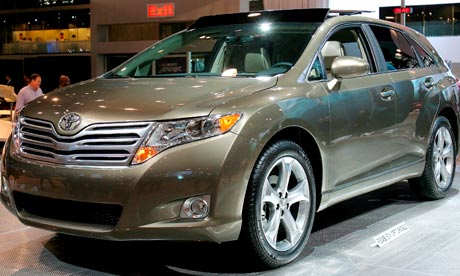
The Toyota Venza crossover sedan is to be the subject of a product recall in the US. Photograph: Justin Lane/EPA
As a byword for reliability and safety, Toyota conquered the ferociously competitive global car market to become the number one manufacturer in the world. But the Japanese company that could once do no wrong has suffered yet another blow to its battered reputation when it said it was recalling 681,500 vehicles in the US due to safety concerns.
Toyota has now recalled more than 10m vehicles in the past three yearsas a litany of technical problems have bedevilled a manufacturer once renowned as a pioneer of production know-how. It has also seen operations devastated by last year's earthquake and tsunami in Japan, and floods in Thailand where many parts are made.
Pummelled by natural disasters, adverse publicity about faulty vehicles and the high yen (which makes exports expensive) Toyota in December warned 2011 profit will be less than half what it was in 2010. Sales have been hit hard, and the Japanese firm has lost market share to resurgent US rivals.
No longer is the company the largest carmaker in the world – a title it grabbed from General Motors in 2008 after decades of American hegemony. GM is now back in the top spot globally, while Germany's Volkswagen has overtaken Toyota in Europe and is scooping awards for reliability and design.
Colin Couchman, senior analyst at IHS Automotive, said: "The latest Toyota recalls are the last thing the company needs as it undermines claims they have turned a corner and will attract the sort of attention the firm could do without."
He added: "Toyota has lost market share in North America, with the Koreans making gains when it comes to smaller vehicles, and GM lifting sales of trucks and SUVs.
"It's important to note the playing field has evened out in America with US companies coming up with some great new models, having killed off their 'dogs,' and with a line up so good they don't have to discount as much as they did."
Instead, the Japanese need to cut prices to claw back what they have lost. This is a relatively new dynamic and "it's going to be intriguing to see how it plays out," said Couchman.
The latest recalls, disclosed by Toyota on Thursday, include about 495,000 Tacoma trucks made between 2005 and 2009 that need to have their steering wheel spiral cable assemblies replaced.
Toyota said friction may occur in some vehicles between the assembly's spiral cable and the retainer, and over time, cut the connection to the driver's airbag.
In addition, it is recalling about 70,500 Camry sedans made during 2009 and about 116,000 Venza crossovers made between 2009/11, to replace lamp switches.
Toyota said it was in the process of obtaining replacement parts. Once it does, it will notify the affected owners and replace the parts for free. Toyota said it was not aware of any accidents or injuries caused by these problems.
The company's carefully cultivated image as safe and reliable has taken a beating after the recall of around 10m vehicles in the last three or four years. The setbacks have dented public confidence and left senior management embarrassed, culminating two years ago in an appearance by then chief executive Akio Toyoda before a US congressional committee where he apologised repeatedly for the faults. There were 14 separate recalls involving Toyota vehicles in 2010 alone.
In 2010, the Japanese carmaker was fined $32.4m (£20.9m) by the US government for failing to swiftly recall millions of vehicles with faulty brakes and steering.
Those fines were the maximum allowed by law. Toyota paid another $16.4m fine related to the recalls, bringing the total to $48.8m.
Another investigation was prompted by the fatal crash of a California highway patrol officer, Mark Saylor, and his family. They died after reporting a stuck accelerator while driving a 2009 Lexus ES 350.
Despite its travails, Toyota has returned to normal production and seen a revival in its sales in the US, one of its biggest markets.
According to the latest data, Toyota's US sales increased by 12% in February from a year earlier. Analysts said the upward trend was likely to continue in the coming months despite the latest recall.
But one problem that's not going away is the strength of yen, still relatively high against the dollar. A strong yen means a substantial dip in the value of repatriated profits for big exporters such as Toyota, as well as putting their products at a competitive pricing disadvantage in export markets.

No comments:
Post a Comment